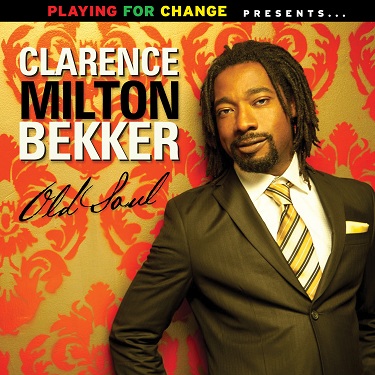Clarence Milton Bekker | Old Soul
Clarence Milton Bekker
Old Soul
(Playing for Change/Concord)
by Brent Faulkner
Clarence Milton Bekker (formerly known as CB Milton) is an R&B artist who has endured career highs and notable lows. A native of Suriname, CB grew up in Netherlands loving music from an early age. In the late 1980s, Milton became a member of The Swinging Soul Machine, a band that backed The Trammps. Milton left the band to focus on a solo career. The 1990s yielded three albums beginning with It’s My Loving Thing, with each successive effort proving less notable…even lesser so in the U.S. After his celebrity ‘bottomed,’ CB Milton found himself consumed by the demons of drugs and personal grief. After moving to Spain, Milton began performing on the street, eventually drawing attention to his gritty, soulful voice and becoming part of Playing For Change, a global showcase for street musicians with talent led by producer Mark Johnson. Eventually, upticks would deliver ‘Clarence Milton Bekker,’ who in turn delivers 2012‘s solid soul effort Old Soul, an album predominately consisting of covers. While Bekker never reinvents the wheel on Old Soul, he does deliver sound, enjoyable performances and certainly rises above adversity.
The effort opens with the William Bell classic “Any Other Way” (which appeared on Bell’s 1967 effort, The Soul of Bell). Vocally, Bekker sounds soulful and solid. The accompanying production is solid as well, consisting of big bass line, soul-laden guitar and piano. There is little to quibble about but one does yearn for some additional harmonized background vocals to strengthen the cut. “Yes We Can Can,” the Allen Toussaint classic, fills this void, including background vocals that add grit to the New-Orleans R&B cut. The production is incredibly funky, suiting the raw nature of Bekker perfectly, and the horns contribute even more to the sensationalism. The best part is Bekker’s ending ad libs which allow the vocalist to be more liberated than he was on the opener.
“One More Heartache” (a Marvin Gaye cover from the late `60s penned by a songwriting team including Smokey Robinson and Marvin Tarplin) is tastefully done, including a fine, if somewhat restrained saxophone solo. The vamp at the end is a highlight for Bekker vocally. “I Wish Someone Would Care,” penned by Irma Thomas some years ago, contrasts grooves by switching to a six-feel as opposed to the standard 4/4. High points include Bekker’s consistent vocal grit as well as the harmonized background vocals which add ‘the cherry on top.’ It is not until “Who is He (And What is He to You)” that Bekker delivers a cut that is nothing short of ‘the top echelon.’ The groove of the Stanley McKenney/Bill Withers classic is instantly infectious and the totality of the production is well executed, including subtle strings not far removed from those that grace The Temptations’ classic “Papa Was a Rolling Stone.” “Who is He” has more inherent ‘authenticity’ than some of the earlier cuts.
“Try A Little Tenderness” (the popular Otis Redding song composed by Jimmy Campbell, Reg Connelly and Harry M. Woods) keeps the momentum high. Bekker sounds electrifying tackling Redding’s muscular nuances to perfection. “Try A Little Tenderness” is so effective because it requires a dominant presence such as Bekker’s to ‘pull it off.’ “Everybody Loves a Winner” does not disappoint either, again channeling William Bell, a la 1967. Also co-written by Booker T. Jones, the classic finds Bekker breathing new life into it, contrasting the grinding nature of “Try A Little Tenderness” in favor of a slower, more earnest feel with organ and electric piano. Bekker and his producers are cruising on ‘autopilot’ now.
“Tomorrow’s Dream” finds Bekker tackling Al Green and producer/co-songwriter Willie Mitchell, hearkening back to Green’s 1970 Hi Records effort Green is Blues. The tempo is blazing, contrasting the balladry of “Everybody Loves a Winner” in favor for Memphis soul. “Tomorrow’s Dream” does not quite reach the pinnacle, but is certainly above par. “Can’t Help But Love You,” written by Reggie McBride, is not extremely flashy but effective. The original “Shine On Me” (co-written by Bekker) is a fine contrast to all of the other cuts, serving almost as an anachronism in 2012. This soul cut opens with Bekker’s jazzy vocals foreshadowing that he is going to ‘open up.’ Sure enough, he does, delivering arguably the album’s best vocal. Showcasing well orchestrated horns and a sound guitar solo, “Shine On Me” is a clear winner. The Isaac Hayes/Dave Porter penned “Hold On, I’m Coming” is a great way to close a solid album. The production is updated yet still retro.
Overall, Old Soul is a sound effort. Bekker possesses a brilliant voice – few would argue this point. If there is quibble, it is that at times Bekker plays it too safe. With the pipes and consummate talent Bekker possesses, there need to be more killer cuts like the penultimate “Shine On Me,” or successive electrifying covers such as “Who is He (And What Is He To You),” “Try A Little Tenderness” and “Everybody Love’s A Winner.”
For all of CB Milton’ struggles, Clarence Milton Bekker seems to have atoned and come ‘full circle’ in the capable direction of Old Soul.
(www.clarencemiltonbekker.eu)
Brent Faulkner
The Urban Music Scene
